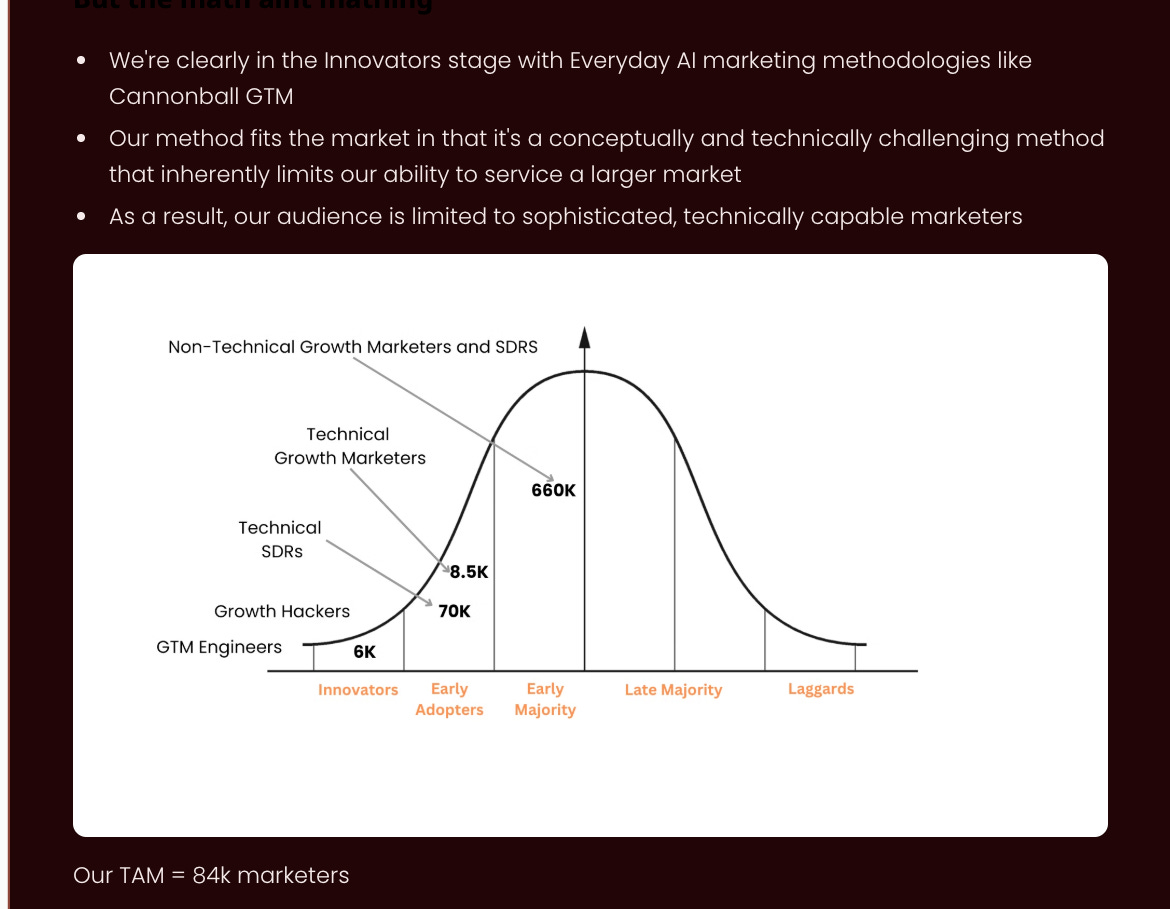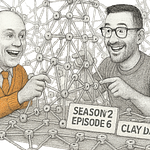It's Clay Day, y'all!
Remember when we cannonballed ourselves a few weeks ago? That livestream where we turned our methodology inward and realized our true pain-based segment was technically capable marketers who were motivated to learn due to inherent job pressures? This week's livestream was a follow-up, showing exactly how we're implementing that insight by creating PVPs (Permissionless Value Propositions) and PQSs (Pain Qualified Segments) at scale using Clay tables, multiple AI models, and a healthy dose of growth-hacking wizardry from Jordan.
Finding Our True Audience Before Building The Machine
In our "Drinking Our Own Champagne" session, we identified a key opportunity: targeting growth hackers and technically-capable marketers with personalized, high-value PVPs. But the question remained – how do we operationalize this at scale?
We'd adjusted our free subscriber goal from an unrealistic 27,000 to a more focused 8,400, targeting specifically those innovators and early adopters who would genuinely value our methodology. This livestream showed the exact mechanism we built to reach them.
The Deep Dive: Clay + AI = PVP Machine
Jordan walked through his entire process. Here's the breakdown of what he built to target our newly defined segment:
Data Collection Layer: Using Zenrose to scrape websites ($69 for 250,000 web pages) and Lead Magic for LinkedIn enrichment
Data Enhancement Layer: Multiple AI agents running in sequence, each building upon the previous one's work
Analysis Layer: ICP analysis, persona development, and PVP research
Generation Layer: Using Gemini 2.5 (the smartest model, according to Jordan) to generate custom PVPs
Quality Control Layer: Using Claude Sonnet to evaluate the quality of the generated PVPs
"This amount of complexity requires you to think really, really carefully about reverse engineering a really great message," Jordan explained. "And so that's what we're teaching these days, which is how do you start with a message, a really great message, and work backwards into the data process?"
The Clay Table Architecture
If you're not familiar with Clay, think of it as a spreadsheet on steroids, where each column can run AI agents, process data, and build upon previous columns.
What made Jordan's implementation especially powerful:
Conditional Running: "Only run when company domain contains a period" – ensuring bad data doesn't waste AI credits
Model Selection: Strategic use of different models for different tasks (4o mini for research, Gemini 2.5 for synthesis, Claude for evaluation)
API Tier Optimization: "You need to have a tier five account... to get a tier five OpenAI key, you need to be able to have spent at least a thousand dollars total ever."
For the Clay heads in our audience, Jordan's tips on API consumption are gold. The campaign was costing 6-10 cents per email – not cheap, but incredibly cost-effective when you consider the value of a good B2B lead.
Let’s Brake it Down
Rather than presenting Jordan's complex process as a finished product, let's break it down into the individual tinker toy pieces that you can assemble for your own automation:
Piece 1: Data Collection - The Foundation Rods
Every automation starts with data. Jordan showed how affordable this can be:
"Zenrows is just very, very, very inexpensive to scrape a lot of websites. So, sixty nine bucks to scrape two hundred fifty thousand web pages."
This is your foundation - collecting website content, company information, and enriching it with professional data using tools like Lead Magic for LinkedIn. The key insight is using tools that scale cost-effectively rather than spending hundreds or thousands on premium data providers.
Listen to this episode with a 7-day free trial
Subscribe to Cannonball GTM to listen to this post and get 7 days of free access to the full post archives.













